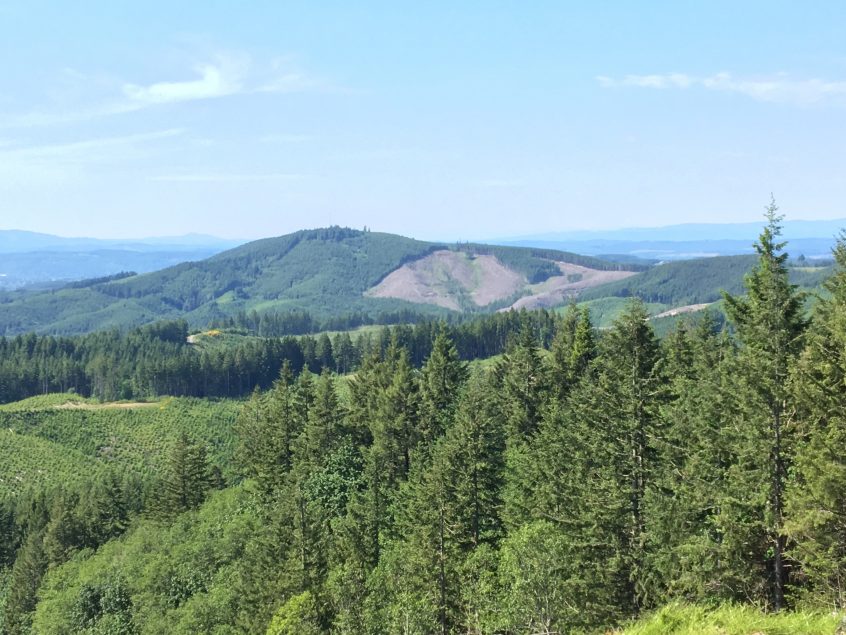More than 25 years ago, Washington state took a historic step toward balancing environmental stewardship with economic vitality through the bipartisan Forests & Fish Law. Forged by legislators from both sides of the aisle – including then-Senator Debbie Regala (D-Tacoma) and then-State Representative Jim Buck (R-Joyce) – the law was built in collaboration, compromise, and an assurance of ongoing scientific analysis.
That shared commitment, embodied in the Forests & Fish Law, became a nationally recognized framework that has succeeded in protecting salmon habitat, improving water quality, and sustaining working forests that provide jobs, revenue, and renewable wood products for the state and beyond.
That balance, according to Regala and Buck in an op-ed published in The Seattle Times this week, is fraying.
The agreement is being tested – and the consequences of disregarding its core principles could be severe, both say. They cite that Public Lands Commissioner Dave Upthegrove paused timber sales on state trust lands containing mature forests with a promise of a six-month review. Nine months later, there’s still no public scientific report, no stated conclusions, and no timeline for resuming the 23 timber sales originally planned for the first half of 2025.
The impact, Buck and Regala point out, is already negatively impacting communities. Counties, mills, and workers that depend on state trust land timber harvests have lost nearly 40% of the funds projected through September – nearly $25 million that should have gone to schools, fire districts, and county services. Without these funds, taxpayers face the prospect of service cuts or higher local taxes.
Meanwhile, the Forest Practices Board is moving to dramatically increase streamside buffer requirements along waterways that house no fish – in some cases expanding buffers by up to 104%. This is despite no scientific evidence that existing buffers are failing to protect water quality or that the proposed changes would improve conditions.
Such rules, the op-ed points out, would take an estimated 235,000 acres out of private working forests, jeopardizing “two sawmills “and reducing available timber enough to build “15,000 homes each year.” Washington state boasts some of the strictest forest protections in the world, with nearly 20% of private forestland set aside for fish and wildlife habitat.
The proposed buffer expansion is rooted in a questionable interpretation of water temperature standards. The Department of Ecology has suggested that a 0.3°C change constitutes a violation, even though scientific evidence shows temperature changes from timber harvests are well below thresholds that harm salmon. Proceeding without weighing the economic and ecological trade-offs violates the Forest Practices Board’s own rules and undermines trust in the process.
The Forest & Fish Law was designed to evolve with the science. But it also recognized the need for balance. The law was a contract to rural communities, private forest landowners, the forestry sector, and the public that if they gave up billions of dollars in timber value to protect streams and wildlife, forest policy would be grounded in transparent, science-based decision making.
The state is poised to renege on that promise.
Pausing state trust land timber sales indefinitely, while imposing sweeping restrictions on private lands without clear scientific justification, amounts to a “one-two punch” to Washington’s forestry sector. It threatens rural jobs, weakens the forestry sector’s infrastructure, and undermines the collaborative model that has guided forest management for 25 years.
But there’s a path forward. The solution lies, both Buck and Regala say, in returning to the principles that made Forests & Fish successful:
- Let science lead and make decisions based on peer-reviewed research, not political pressure or assumptions.
- Honor the process by following the rules for transparency, public input, collaboration, and stakeholder engagement.
- Balance environmental and economic needs to protect salmon and water quality while sustaining working forests and rural economies.
- Collaborate across divides and recognize that bipartisan cooperation is possible when the focus is on solutions.
Washington’s working forests, communities, and wildlife deserve policies shaped by facts, guided by trust, and grounded in the spirit of Forests & Fish.
Though the formal comment period on the proposed rule has closed, Regala and Buck urge people to continue to share their thoughts with the Forest Practices Board at forest.practicesboard@dnr.wa.gov.
